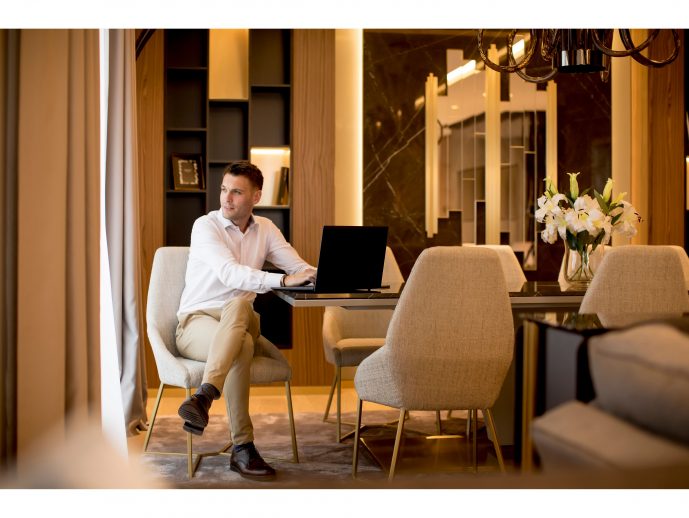Categories more
- Adventures (17)
- Arts / Collectables (15)
- Automotive (37)
- Aviation (11)
- Bath, Body, & Health (77)
- Children (6)
- Cigars / Spirits (32)
- Cuisine (16)
- Design/Architecture (22)
- Electronics (13)
- Entertainment (4)
- Event Planning (5)
- Fashion (46)
- Finance (9)
- Gifts / Misc (6)
- Home Decor (45)
- Jewelry (41)
- Pets (3)
- Philanthropy (1)
- Real Estate (16)
- Services (23)
- Sports / Golf (14)
- Vacation / Travel (60)
- Watches / Pens (15)
- Wines / Vines (24)
- Yachting / Boating (17)
How A Luxurious Lifestyle Can Impact One's Confidence
Published
06/18/2024A luxurious lifestyle frequently brings to mind images of high-end fashion, exotic travel, and exclusive experiences. However, it encompasses more than mere material possessions; it represents a way of life marked by comfort, indulgence, and the liberty to pursue personal passions. One might ponder how a life filled with opulence and grandeur can influence an individual's confidence.
This article delves into the intriguing relationship between luxury and self-assurance, investigating how the finer aspects of life can impact our self-perception, beliefs, and overall confidence.
The Psychological Perks of Living Large
Living a luxurious lifestyle frequently brings a range of psychological benefits. Indulging in high-quality experiences and surrounding yourself with beautiful things can boost self-esteem and create a sense of accomplishment. For example, investing in a designer handbag or a piece of fine art can make you feel successful and sophisticated. Even investing in cosmetic procedures like getting the best liposuction to enhance your appearance can significantly improve your self-image and confidence.
Luxury significantly influences social psychology. Material possessions often serve as signals of wealth and status to others, which is not merely about vanity but rather a deeply ingrained human behavior. Consider this: a luxury car is more than just transportation; it symbolizes success. Similarly, a Rolex watch is not merely a timepiece; it represents status. Owning such items allows us to enjoy them personally while also conveying our achievements to the world around us. This social recognition can enhance our self-esteem and reinforce our sense of belonging within a specific social circle.
Of course, it's important to note that these psychological benefits aren't guaranteed. While luxury can certainly contribute to a positive self-image, it's not a magic solution for low self-esteem or insecurity. True confidence comes from within, and material possessions are just one piece of the puzzle.
Luxury and Confidence Across Cultures
The relationship between luxury and confidence isn't uniform across the globe. Different cultures have unique perspectives on what constitutes luxury and how it relates to self-assurance.
Western Cultures
In Western cultures, the narrative of the 'self-made' individual is deeply ingrained. This narrative often equates luxury with personal accomplishment and upward mobility. For example, a young entrepreneur who builds a successful tech startup and rewards themselves with a luxury sports car is seen as embodying this ideal. The car becomes a symbol of their hard work, innovation, and financial success.
Similarly, a high-powered executive who climbs the corporate ladder and invests in a luxury penthouse apartment is seen as having 'earned' their lifestyle through dedication and perseverance. The apartment becomes a tangible representation of their professional achievements and social standing.
These examples illustrate how luxury goods can serve as a sort of 'trophy' for personal accomplishments in Western societies. They reinforce the belief that hard work and determination can lead to material rewards, thereby boosting confidence and self-worth.
- Eastern Cultures
In Japan, for instance, the concept of 'wabi-sabi' embraces imperfection and simplicity. Luxury might be found in a handcrafted tea bowl with subtle imperfections or a meticulously arranged ikebana flower arrangement. These items are valued for their craftsmanship, connection to nature, and ability to enhance a sense of tranquility and mindfulness, rather than as a display of wealth.
In India, luxury often manifests in the rich tradition of handcrafted textiles and jewelry. Owning a silk sari with intricate embroidery or a piece of gold jewelry passed down through generations is seen as a way to honor heritage and cultural traditions. These items are not just symbols of personal wealth but also a connection to family and community.
In China, the concept of 'mianzi' or 'face' plays a significant role in social interactions. Luxury can be a way to enhance one's social standing and bring honor to one's family. However, it's often expressed through subtle gestures, such as hosting elaborate banquets for friends and family or donating to charitable causes. This emphasis on community and shared experiences reflects a more nuanced understanding of luxury as a means of fostering social connections and contributing to the well-being of others. - Societal Pressures and the Luxury Trap
Regardless of cultural background, societal expectations can play a significant role in how we perceive luxury and its impact on confidence. In many societies, there's an unspoken pressure to achieve a certain level of material success. This can lead to a 'luxury trap,' where individuals feel the need to constantly acquire more and more possessions to maintain their status and feel confident.
This pressure can be particularly intense in the age of social media, where curated images of luxurious lifestyles are constantly on display. It's important to remember that these images often present an idealized version of reality. Chasing an unattainable standard of luxury can lead to feelings of inadequacy and dissatisfaction, ultimately eroding confidence rather than building it.
Final Words
As we've explored in this article, the relationship between a luxurious lifestyle and confidence is a multifaceted one. While luxury can undoubtedly boost self-esteem and provide a sense of accomplishment, it's not the sole determinant of true confidence.
Cultural perspectives, societal expectations, and personal values all play a role in shaping how we perceive luxury and its impact on our self-assurance. It's essential to remember that confidence comes from within, and while material possessions can contribute to it, they shouldn't be the sole source.
Ultimately, a healthy relationship with luxury involves enjoying the finer things in life while maintaining a balanced perspective and focusing on personal growth and meaningful experiences. By doing so, we can reap the benefits of a luxurious lifestyle without falling into the 'luxury trap' or losing sight of what truly matters.
















